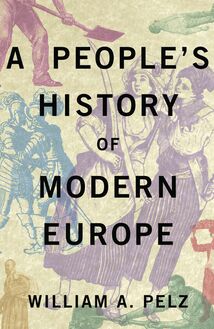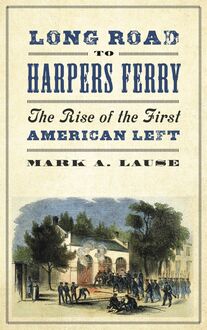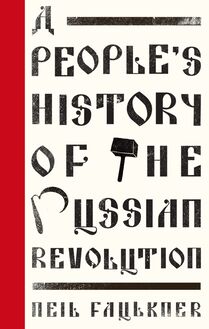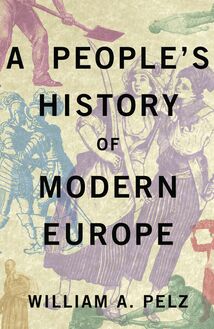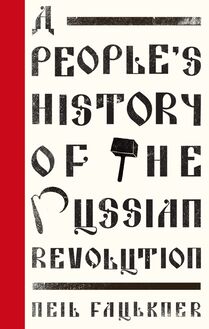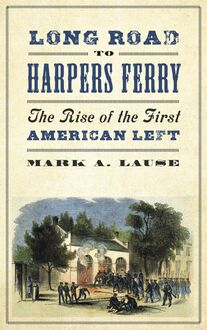-
 Univers
Univers
-
 Ebooks
Ebooks
-
 Livres audio
Livres audio
-
 Presse
Presse
-
 Podcasts
Podcasts
-
 BD
BD
-
 Documents
Documents
-
- Cours
- Révisions
- Ressources pédagogiques
- Sciences de l’éducation
- Manuels scolaires
- Langues
- Travaux de classe
- Annales de BEP
- Etudes supérieures
- Maternelle et primaire
- Fiches de lecture
- Orientation scolaire
- Méthodologie
- Corrigés de devoir
- Annales d’examens et concours
- Annales du bac
- Annales du brevet
- Rapports de stage
La lecture à portée de main
Vous pourrez modifier la taille du texte de cet ouvrage
Découvre YouScribe en t'inscrivant gratuitement
Je m'inscrisDécouvre YouScribe en t'inscrivant gratuitement
Je m'inscrisEn savoir plus
Vous pourrez modifier la taille du texte de cet ouvrage
En savoir plus

Description
The establishment of the Weimar Republic in 1919 ended the revolution, relegating all but its most prominent leaders to a historical footnote. In A People's History of the German Revolution, William A. Pelz cuts against the grain of mainstream accounts that tend to present the revolution as more of a 'collapse', or just a chaotic interregnum that preceded the country's natural progression into a republic.
Going beyond the familiar names of Karl Liebknecht, Rosa Luxemburg or Clara Zetkins, Pelz explores the revolution from the bottom up, focusing on the active role that women, rank-and-file activists, and ordinary workers played in its events. Rejecting the depiction of agency as exclusively in the hands of international actors like Woodrow Wilson or in those of German elites, he makes the compelling case that, for a brief period, the actions of the common people shaped a truly revolutionary society.
Foreword by Mario Kessler
Introduction: What German Revolution?
1. Industrialization and the Emergence of the German Working Class
2. The Rise of Popular Radicalism
3. War, Suffering and Resistance
4. The Road to the November Revolution
5. The Kaiser Goes, the Generals Remain
6. Provocation, Revolt and Repression
7. Women in the War and the Revolution
8. Death Agony of the Revolution
Conclusion
Notes
Index
Sujets
1914-1918
Political Advocacy
Elections
Political Process
Political Ideologies
HISTORY
POLITICAL SCIENCE
Histoire
Trade Unions
Revolutions
Armada de los Estados Unidos
Partido Comunista de Alemania
Rosa Luxemburgo
Advocacy group
Communism
Revolutionary
World War I
Economic shortage
November Revolution
Interwar period
German Revolution of 1918?19
Wage
German Communist Party
Independent Social Democratic Party of Germany
International Women's Day
Protest
Communist Party of Germany
General officer
Military
Social Democratic Party
Mutiny
Poverty
Wilhelm II, German Emperor
Revolution
Trade union
History of Germany
History of Europe
Freikorps
Capitalism
Army
Corps franc
General
Germany
Navy
Kaiser Wilhelm II
Communisme
Clara Zetkin
KPD
Friedrich Ebert
Violence
Rosa Luxemburg
Friedrich Engels
Karl Liebknecht
Première Guerre mondiale
1919
Media
Europe
Informations
| Publié par | Pluto Press |
| Date de parution | 20 juin 2018 |
| Nombre de lectures | 0 |
| EAN13 | 9781786802491 |
| Langue | English |
Informations légales : prix de location à la page 0,0748€. Cette information est donnée uniquement à titre indicatif conformément à la législation en vigueur.
Extrait
A People s History of the German Revolution
People s History
History tends to be viewed from the perspective of the rich and powerful, where the actions of small numbers are seen to dictate the course of world affairs. But this perspective conceals the role of ordinary women and men, as individuals or as parts of collective organisations, in shaping the course of history. The People s History series puts ordinary people and mass movements centre stage and looks at the great moments of the past from the bottom up.
The People s History series was founded and edited by William A. Pelz (1951-2017).
Also available:
Long Road to Harpers Ferry The Rise of the First American Left Mark A. Lause
A People s History of the Portuguese Revolution Raquel Varela
A People s History of the German Revolution
1918-19
William A. Pelz
Foreword by Mario Kessler
First published 2018 by Pluto Press
345 Archway Road, London N6 5AA
www.plutobooks.com
Copyright the Estate of William A. Pelz 2018
British Library Cataloguing in Publication Data
A catalogue record for this book is available from the British Library
ISBN 978 0 7453 3711 1 Hardback
ISBN 978 0 7453 3710 4 Paperback
ISBN 978 1 7868 0248 4 PDF eBook
ISBN 978 1 7868 0250 7 Kindle eBook
ISBN 978 1 7868 0249 1 EPUB eBook
This book is printed on paper suitable for recycling and made from fully managed and sustained forest sources. Logging, pulping and manufacturing processes are expected to conform to the environmental standards of the country of origin.
Typeset by Stanford DTP Services, Northampton, England
Simultaneously printed in the United Kingdom and United States of America
Contents
Foreword by Mario Kessler
Introduction: What German Revolution?
1. Industrialization and the Emergence of the German Working Class
2. The Rise of Popular Radicalism
3. War, Suffering and Resistance
4. The Road to the November Revolution
5. The Kaiser Goes, the Generals Remain
6. Provocation, Revolt and Repression
7. Women in the War and the Revolution
8. Death Agony of the Revolution
Conclusion
Notes
Index
Foreword
Mario Kessler
A People s History of the German Revolution, 1918-19 , is the last book by the American historian William Arthur ( Bill ) Pelz, who died at age 66 on December 10, 2017 in his hometown of Chicago.
The son of a bus driver, Bill Pelz was connected to working people by origin and attitude. He wrote his doctoral thesis in 1988, inspired by Arthur Rosenberg s classic work The Birth of the German Republic , on the Spartacus League in the German November Revolution. * Documentary books on Eugene V. Debs and Wilhelm Liebknecht followed. Against Capitalism: The European Left on the March was published in 2008, Karl Marx: A World to Win four years later, German Social Democracy: A Documentary History in 2015, and finally A People s History of Modern Europe in 2016. Among his numerous editorial works, his contributions to the Encyclopedia of the European Left and his appointment as a co-editor of Rosa Luxemburg s works in English must also be mentioned. A lifelong Chicagoan, he held positions as a contingent professor at Roosevelt University, and then as Director of Social Science Programs at De Paul University. For the past 20 years, the Marxist historian was professor of European history and political science at Elgin Community College on the outskirts of Chicago.
A People s History of the German Revolution, 1918-19, a manuscript completed by Pelz just days before his unexpected loss, returns the author to the starting point of his career as a historian. The title should remind us of Howard Zinn s A People s History of the United States. Both Zinn s and Pelz s works unashamedly make the social history of working-class women and men accessible, vital and popular. Yet, unlike Zinn s documentary approach, Pelz s interpretive history of the German Revolution might benefit from an introduction to the historical context of this crucial moment in German and working-class history for those less familiar with German history. Why should readers be curious about this book, a brilliant and entirely fresh overview of an important period of German and European history?
The book introduces the reader to German social history of the nineteenth and early-twentieth centuries; a time that seems distant, but whose problems, as this book shows, remain present today. Compared to England and France, Germany was a belated nation: its bourgeoisie only appeared as a historical force when it felt the breath of the emerging working class at its neck. Thus, in the European revolutionary year of 1848, the middle class was neither willing nor able to fight out the struggle for national unity together with lower classes, especially workers. Instead, the German bourgeoisie allied itself with the forces led by Prussian Chancellor Otto von Bismarck. After the Prussians fought and won three wars against their neighbors, they unified the new state from above ; in 1871, most German-speaking territories became part of a new German Empire (with the notable exception of Austria which remained part of the Habsburg Empire). This sealed the alliance between the emerging imperialist bourgeoisie and the old nobility, the class which provided the German military and diplomatic elite.
Denied any meaningful political role in the new state, workers were attracted to the Social Democratic Party (SPD), whose path to the strongest electoral force in the German Empire is impressively traced in this book. The social-democratic workers and the left-wing intellectuals supporting them formed an increasingly dense network of trade unions, media, cooperatives and cultural organizations whose structures grew as an alternative to the dominant culture of bourgeois German society.
But this social-democratic counter-society faced a dilemma: the more it grew into a counter-society in the state, the more its leaders and administrative functionaries no longer wanted to eliminate this state. Rather than abolish bourgeois society in the Hegelian sense, SPD leaders and theorists sought to peacefully take over the states institutions through social and electoral reform. At the same time, revolutionary rhetoric remained central to SPD theory.
As early as 1896, Bertrand Russell * sharply recognized that this contradiction within the SPD overlapped the fundamental contradiction of German society-that the largest and strongest class remained excluded from participation in society. Although men, but not women, had universal, equal and secret suffrage in the Reich, the German parliament, the Reichstag , had no real executive power in comparison with the Emperor. In Prussia, by far the most important of the German states, a three-class franchise system gave the dispossessed classes less voting rights than the upper class. Moreover, the SPD s increasing bureaucratic direction resulted in a distinct cultural cleavage between the party s career-oriented professionalism and its working-class electoral and trade union base.
Social Democratic Party leaders believed that through an alliance with the liberal wing of the bourgeoisie they would gain one concession after another from the ruling classes, resulting in the conditions for a peaceful transition to socialism. A minority in the party criticized these policies as reformist illusions, Rosa Luxemburg perhaps most notably. The Polish Marxist, who devoted her life to the German workers movement, came to understand most precisely that the liberal bourgeoisie would rather seek a compromise with the reactionary landlords, industrialists, and the military at the expense of the working class, and that the ruling elites would never give away class power to workers in the form of civil and economic rights. In fact, the Imperial Court, the landlords and the military forged an ever stronger alliance with the industrial and financial capital in order to realize their great political project, that Germany would be elevated from the rank of a European power to the rank of the pre-eminent European power, and a world power, even if it required deadly war with neighboring states.
The war that began in August 1914 was in fact a consequence of the imperialist policies of Germany as well as its allies and opponents, and waged by all warring parties with great brutality and without consideration for human losses. In the first industrialized war, all available human and material resources were mobilized to sustain the war effort. Bill Pelz s book examines evidence and reports from frontline soldiers, and workers and soldiers wives and families, to depict conditions and acts of resistance at the front and in the hinterland. The increasing number of strikes and intensifying labor conflict in war-time Germany-revolutionary preludes-are of particular interest. Here the book incisively demonstrates how much the common people, and especially women, are a force of history. Pelz also shows the ways in which the unique contributions of intellectuals, working-class activists, and women and men from right to left, from Victor Klemperer to K te and Hermann Duncker, actively and consciously sought to influence German politics and society.
At the end of the war both losers and victors found themselves in a state of utter exhaustion. Everywhere economies were in disarray. In Tsarist Russia, Austria-Hungary, and Imperial Germany governmental systems collapsed entirely. Even before the armistice had been signed, a rebellion against Imperial German authorities by soldiers and workers seeking an end to the slaughter and the starvation, initiated the German Revolution of 1918-19.
As a consequence of the military defeat of Germany and the anger of the masses, and triggered by a naval mutiny, in days the revolution spread throughout the whole country. There was no appreciable resistance from the old order. Workers joined forces with sailors and soldiers in an enormous mass movem
-
 Univers
Univers
-
 Ebooks
Ebooks
-
 Livres audio
Livres audio
-
 Presse
Presse
-
 Podcasts
Podcasts
-
 BD
BD
-
 Documents
Documents
-
Jeunesse
-
Littérature
-
Ressources professionnelles
-
Santé et bien-être
-
Savoirs
-
Education
-
Loisirs et hobbies
-
Art, musique et cinéma
-
Actualité et débat de société
-
Jeunesse
-
Littérature
-
Ressources professionnelles
-
Santé et bien-être
-
Savoirs
-
Education
-
Loisirs et hobbies
-
Art, musique et cinéma
-
Actualité et débat de société
-
Actualités
-
Lifestyle
-
Presse jeunesse
-
Presse professionnelle
-
Pratique
-
Presse sportive
-
Presse internationale
-
Culture & Médias
-
Action et Aventures
-
Science-fiction et Fantasy
-
Société
-
Jeunesse
-
Littérature
-
Ressources professionnelles
-
Santé et bien-être
-
Savoirs
-
Education
-
Loisirs et hobbies
-
Art, musique et cinéma
-
Actualité et débat de société
- Cours
- Révisions
- Ressources pédagogiques
- Sciences de l’éducation
- Manuels scolaires
- Langues
- Travaux de classe
- Annales de BEP
- Etudes supérieures
- Maternelle et primaire
- Fiches de lecture
- Orientation scolaire
- Méthodologie
- Corrigés de devoir
- Annales d’examens et concours
- Annales du bac
- Annales du brevet
- Rapports de stage

